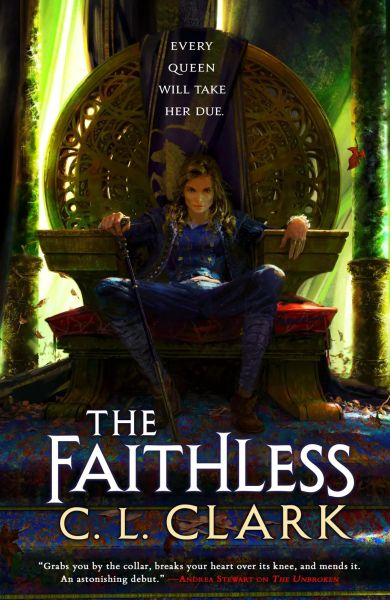Whenever You’re In Trouble
The Faithless (Magic of the Lost, volume 2)
By C. L. Clark

26 May, 2023
C. L. Clark’s 2023 The Faithless is the second volume in the on-going Magic of the Lost secondary-world fantasy trilogy1.
In the first volume: the city of Qazāl and the regions around Qazāl have been liberated from the imperialist Balladairans. Also, Princess Luca hopes to succeed to the throne of Balladaire, replacing her unpleasant uncle.
Surely every significant problem has been solved, leaving characters to focus on ill-advised love affairs. Then stuff happens.
Qazāl was once part of the Shālan empire. Having driven off one group of imperialists, the disparate peoples of the former empire are not keen to replace the invaders with new rulers. A coalition of equals is required. It’s too bad that each faction assumes that the wisest and best group should dominate the alliance … and they are the best. There’s no consensus and a lot of friction.
The context: Qazāl and its allies are divided and poor. Also, there is the ever-present possibility that the Balladairans will return to crush the region again. How can this be avoided? Diplomacy. Someone should travel to Balladaire and make the case for Qazāl independence.
Gruff soldier Touraine played a vital role in freeing Qazāl. A former Sand, a conscript soldier in the Balladairan forces, she is familiar with Balladairan ways. Even better, she and Princess Luca were very close. A reluctant Touraine is voluntold to serve as ambassador.
As Queen, Luca will surely embrace the cause of Qazāl independence. However, standing between Luca’s role as Princess and her role as Queen is her uncle, Duke Nicolas Ancier. Duke Nicolas will not willingly step down as regent. Luca has legal right on her side. The duke is more experienced; he’s canny, has the support (willing and otherwise) of important people, and is utterly ruthless. The odds do not favour Luca.
Unlike her uncle, Luca has a keen interest and belief in magic. Magic is powerful. Magic is also something that the kingdom of Balladaire made a deliberate choice to reject. Would-be Queen Luca does not know why. She will learn.
~oOo~
The basic problem with magic is three-fold:
- There is no such thing as a free lunch. Magic has a price.
- I eat, you pay works. Running up bills on someone else’s tab can be very attractive.
- Warning people about the abuses to which magic lends itself draws attention to the tempting ways one can better oneself at the expense of others.
In short, Balladaire had good reason to shun magic and pretty good reasons to frame the issue as simply rejecting superstition. Security by obscurity isn’t perfect, but it did work for over a century.
I am astounded that social issues that divided the Shālan empire still divide its regions after their liberation from Balladaire. One might think the existential threat presented by Balladaire would inspire the liberators to embrace mutual accommodation to better serve the common defense. It’s odd that establishing a new government seems to be a slow process for which there is time only because of the dynastic dispute across the ocean. It is almost as though governing can be difficult, particularly when the government is post-revolutionary and every faction is led by heavily armed war veterans.
One might also expect that Balladaire, having failed so abjectly in Qazāl, would reassess their ambitions and their belief in their own superiority. Perhaps a handful of Balladairians are willing to eschew imperialism. But the majority of the populace still believes in the Balladairian right to expand and rule, that doing so is beneficial for the conquered. Recent setbacks were mere aberrations and the future will be bright!
Clark’s vividly depicted protagonists, Luca and Touraine, both appear to be ill-suited for the roles into which they are thrust. Touraine is familiar with Balladaire … from the perspective of a despised minority. She lacks any diplomatic finesse. Likewise, would-be Queen Luca has lofty goals but no skill at realizing them. She’s still alive, which argues that her uncle [2] regards her as an irritant rather than a real threat. Killing her might have worse consequences than just letting her flutter around the fringes of power. Not that this will necessarily keep her alive, as player in power game that is played hard, for keeps.
The Faithless is a worthy sequel to its predecessor. The Faithless can also be read as a stand-alone. It also works nicely as a set-up for the third volume, for which I am waiting with some impatience. Sigh. Final volumes of trilogies. I never learn.
The Faithless is available here (Amazon US), here (Amazon Canada), here (Amazon UK), here (Apple Books), here (Barnes & Noble), and here (Chapters-Indigo).
1: In the context of publishing, labeling something a trilogy suggests that the series will have somewhere between one (if sales are terrible) and a dozen or more volumes (if sales are good).
2: While the Duke is a terrible person with terrible beliefs, it is easy to make a case that he is a far better administrator than his niece would be. It’s an interesting question: is a villain with a talent for governance a better or worse choice than someone with lofty ideals that they have no idea how to turn into policy and action?
